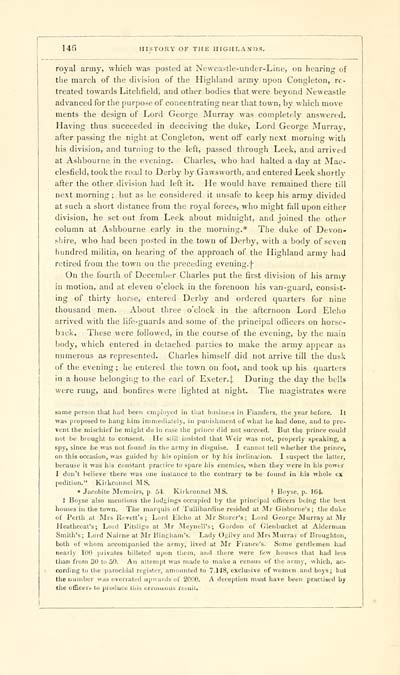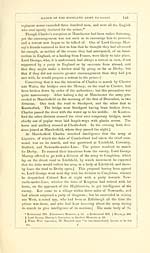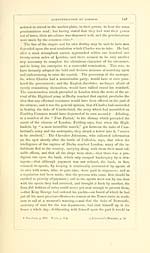Download files
Complete book:
Individual page:
Thumbnail gallery: Grid view | List view

146 HISTORY OF THE HIGHLANDS.
royal army, which was posted at Newcastle-under-Line, on hearing of
tlie march of the division of the Highland army upon Congleton, re-
treated towards Litchfield, and otlier bodies that were beyond Newcastle
advanced for tlie purpose of concentrating near tliat town, by wliich move
ments the design of Lord George Murray was completely answered.
Having thus succeeded in deceiving the duke, Lord George Murray,
after passing tlie night at Congleton, went off early next morning witli
his division, and turning to the left, passed through Leek, and arrived
at Ashbourne in the evening. Charles, who had halted a day at Mac-
clesfield, took the road to Derby by Gawsworth, and entered Leek shortly
after the other division had left it. He would have remained there till
next morning ; but as he considered it unsafe to keep his army divided
at such a short distance from the royal forces, who might fall upon either
division, he set out from Leek about midnight, and joined the other
column at Ashbourne early in the morning.* The duke of Devon-
shire, who had been posted in the town of Derby, with a body of seven
hundred militia, on hearing of the approach of the Highland army had
retired from the town on the preceding evening.f
On the fourth of December Charles put the first division of his army
iu motion, and at eleven o'clock in the forenoon his van-guard, consist-
ing of thirty horse, entered Derby and ordered quarters for nine
thousand men. About three o'clock in the afternoon Lord Elclio
arrived with the life-guards and some of the principal officers on horse-
back. These were followed, in the course of the evening, by the main
body, which entered in detached parties to make the army appear as
numerous as represented. Charles himself did not arrive till the dusk
of the evening ; he entered the town on foot, and took up his quarters
in a house belonging to the earl of Exeter.f During the day the bells
were rung, and bonfires were lighted at night. The magistrates were
same person that had been employed in that busine^s in Flanders, the year before. It
was proposed to hang him imniediatel}-, In punishment of what he had done, and to pre-
vent the mischief he might do in case the prince did not succeed. But the prince could
not be brought to consent. He siill insisted that Weir was not, properly speaking, a
spy, since he was not found in the army in disguise. I cannot tell whether the prince,
on this occasion, was guided by his opinion or by his inclinaiion. I suspect the latter,
because it was his constant practice to spare his enemies, when they were in his powt-j-
I don't believe there was one instance to the contrary to be found iu his whole ex
pedition." Kirkconnel MS.
• Jacobite Memoirs, p. 54. Kirkconnel MS. t Boyse, p. I&k
t Boyse also mentions the lodgings occupied by the principal officers being the best
houses in the town. The marquis of TuUibardine resided at I\Ir Gisborne's ; the duke
of Perth at Mrs Rtvett's; Lord Elcho at MrStorer's; Lord George Murrtiy at Mr
Heathcoat's; Lord PiLsligo at Mr Meynell's; Gordon of (Jlenbucket at Alderman
Smith's; Lord Nairne at Mr Bingham's. Lady Ogilvy and Mrs Murray of Broughton,
both of whom accompanied the army, lived at Mr France's. Some gentlemen had
nearly 100 privates billeted upon Uiem, and there were few houses that had less
than from 30 to 50. An attempt was made to make a census of the army, whidt, ao
cording to the parochial register, amounted to 7,148, exclusive of women and boys ; hul
the number was overrated uputirds of 2000. A deception must have tieeii practised by
the otHcerA to produce thi:, erroneous re»ult.
royal army, which was posted at Newcastle-under-Line, on hearing of
tlie march of the division of the Highland army upon Congleton, re-
treated towards Litchfield, and otlier bodies that were beyond Newcastle
advanced for tlie purpose of concentrating near tliat town, by wliich move
ments the design of Lord George Murray was completely answered.
Having thus succeeded in deceiving the duke, Lord George Murray,
after passing tlie night at Congleton, went off early next morning witli
his division, and turning to the left, passed through Leek, and arrived
at Ashbourne in the evening. Charles, who had halted a day at Mac-
clesfield, took the road to Derby by Gawsworth, and entered Leek shortly
after the other division had left it. He would have remained there till
next morning ; but as he considered it unsafe to keep his army divided
at such a short distance from the royal forces, who might fall upon either
division, he set out from Leek about midnight, and joined the other
column at Ashbourne early in the morning.* The duke of Devon-
shire, who had been posted in the town of Derby, with a body of seven
hundred militia, on hearing of the approach of the Highland army had
retired from the town on the preceding evening.f
On the fourth of December Charles put the first division of his army
iu motion, and at eleven o'clock in the forenoon his van-guard, consist-
ing of thirty horse, entered Derby and ordered quarters for nine
thousand men. About three o'clock in the afternoon Lord Elclio
arrived with the life-guards and some of the principal officers on horse-
back. These were followed, in the course of the evening, by the main
body, which entered in detached parties to make the army appear as
numerous as represented. Charles himself did not arrive till the dusk
of the evening ; he entered the town on foot, and took up his quarters
in a house belonging to the earl of Exeter.f During the day the bells
were rung, and bonfires were lighted at night. The magistrates were
same person that had been employed in that busine^s in Flanders, the year before. It
was proposed to hang him imniediatel}-, In punishment of what he had done, and to pre-
vent the mischief he might do in case the prince did not succeed. But the prince could
not be brought to consent. He siill insisted that Weir was not, properly speaking, a
spy, since he was not found in the army in disguise. I cannot tell whether the prince,
on this occasion, was guided by his opinion or by his inclinaiion. I suspect the latter,
because it was his constant practice to spare his enemies, when they were in his powt-j-
I don't believe there was one instance to the contrary to be found iu his whole ex
pedition." Kirkconnel MS.
• Jacobite Memoirs, p. 54. Kirkconnel MS. t Boyse, p. I&k
t Boyse also mentions the lodgings occupied by the principal officers being the best
houses in the town. The marquis of TuUibardine resided at I\Ir Gisborne's ; the duke
of Perth at Mrs Rtvett's; Lord Elcho at MrStorer's; Lord George Murrtiy at Mr
Heathcoat's; Lord PiLsligo at Mr Meynell's; Gordon of (Jlenbucket at Alderman
Smith's; Lord Nairne at Mr Bingham's. Lady Ogilvy and Mrs Murray of Broughton,
both of whom accompanied the army, lived at Mr France's. Some gentlemen had
nearly 100 privates billeted upon Uiem, and there were few houses that had less
than from 30 to 50. An attempt was made to make a census of the army, whidt, ao
cording to the parochial register, amounted to 7,148, exclusive of women and boys ; hul
the number was overrated uputirds of 2000. A deception must have tieeii practised by
the otHcerA to produce thi:, erroneous re»ult.
Set display mode to: Large image | Transcription
Images and transcriptions on this page, including medium image downloads, may be used under the Creative Commons Attribution 4.0 International Licence unless otherwise stated. ![]()
| Early Gaelic Book Collections > Ossian Collection > History of the Highlands and of the Highland clans > Volume 3 > (176) |
|---|
| Permanent URL | https://digital.nls.uk/79654534 |
|---|
| Description | Vol. III. |
|---|---|
| Shelfmark | Oss.249 |
| Attribution and copyright: |
|
| Description | Selected books from the Ossian Collection of 327 volumes, originally assembled by J. Norman Methven of Perth. Different editions and translations of James MacPherson's epic poem 'Ossian', some with a map of the 'Kingdom of Connor'. Also secondary material relating to Ossianic poetry and the Ossian controversy. |
|---|
| Description | Selected items from five 'Special and Named Printed Collections'. Includes books in Gaelic and other Celtic languages, works about the Gaels, their languages, literature, culture and history. |
|---|

